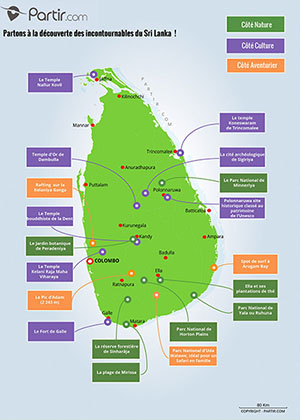The 13 best places to visit in Sri Lanka

Each time I go to Sri Lanka, I am amazed by the richness of this Treasure island. There are so many things to see in Sri Lanka... Located at the crossroads of different worlds, the many sites listed as UNESCO World Heritage formerly known as Ceylon are proof of its rich cultural heritage. For history lovers, a visit to the Cultural Triangle is a must-do. In front of the Bodhi Sacred tree of Anuradhapura, on the top of the Sigiriya fortress, in the caves of Dambulla, or in the ruins of Polonnaruwa, you will be taken back to the Golden age of the Ancient cities of Sri Lanka. The big cities of Colombo, Kandy and Jaffna each have their own particular charm and style and are perfect examples of the vibrancy of the country as a whole. Spirituality prevails in Sri Lanka, emblematic temples show the importance of Buddhism and also Hinduism in the country. Don't miss out on the old fortified town of Galle, the most charming Colonial city of Sri Lanka. If you prefer nature, mountain walks and fresh air, explore the Tea Region. From Nuwara Eliya to Ella, you will be driven across landscapes covered with tea plantations, waterfalls and spectacular viewpoints. Wildlife lovers can head for a safari in the Yala National park to see beautiful animals such as elephants and leopards. Whereas sports enthusiasts can go hiking on a very special mountain: Adam’s Peak. Going to Sri Lanka is also an opportunity to relax on the southern or Trincomalee beaches. Be it surfing or snorkelling, there are so many different activities to satisfy everyone on the beaches of Sri Lanka.
Tourist attractions
Our selection of must-see places
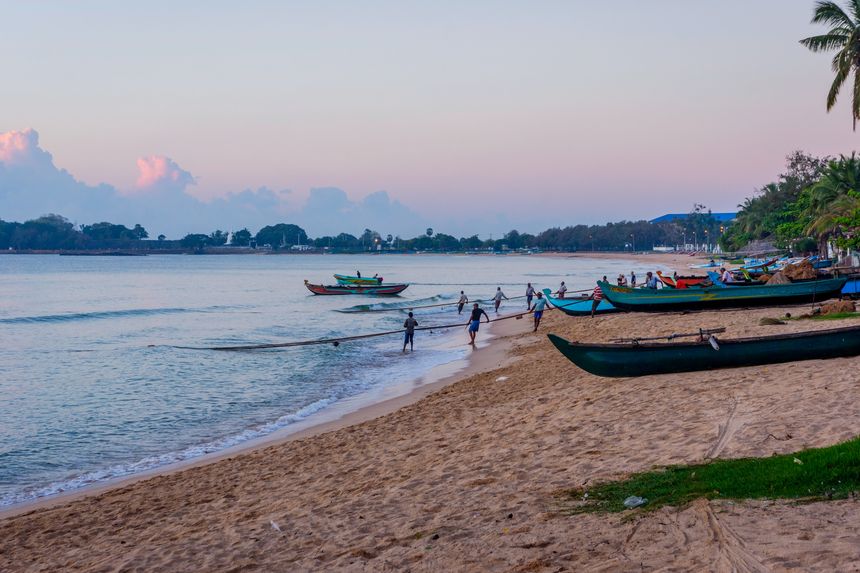

Trincomalee
On the East coast of Sri Lanka, Trincomalee, nicknamed Trinco, is renowned for its beautiful coastline and long white sandy beaches. This historic harbour has greatly suffered as a result of both the civil war and the devastating tsunami. In recent years, tourism has revived the region and the number of travellers have been increasing more and more each year. In the city centre, take a walk to Fort Frederick, built by the Portuguese in the early 17th century. Visit the Hindu temple Koneswaram which overlooks the beautiful Trincomalee Bay. Most people come to Trincomalee to relax on the beaches of Nilaveli and Uppuveli, which are among the most beautiful in the country. From Nilaveli Beach, a boat trip takes you to Pigeon Island, one of Sri Lanka's best snorkelling spots. This is the perfect opportunity to swim around the preserved reefs with small sharks and turtles!
Monuments | Diving | Beaches & Seaside resort | Port
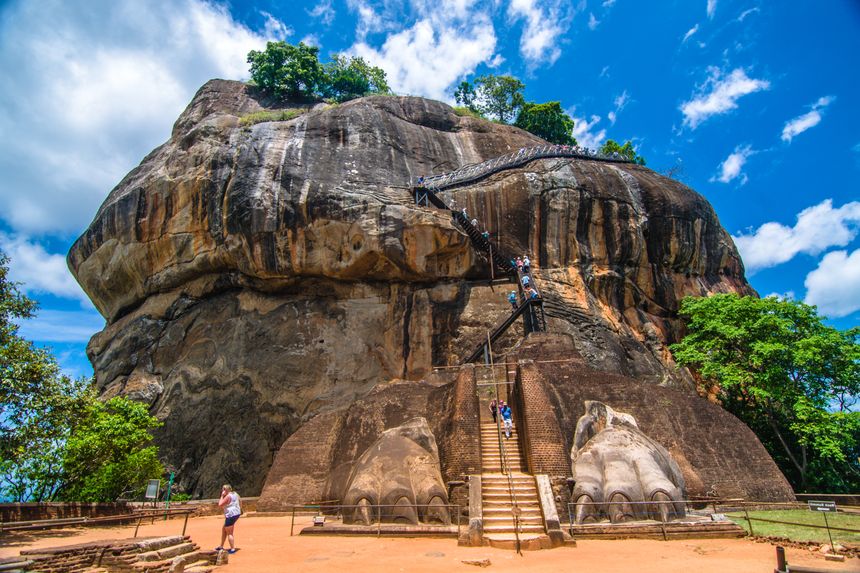

Sigiriya
In the heart of the Cultural Triangle, Sigiriya is an iconic place in Sri Lanka, it is listed as a UNESCO World Heritage site. Also called the 'Lion rock', this massive rock boulder shelters the ruins of King Kassyapa’s palace. That is where the king fled after having killed his father and having forced his brother out of the Sri Lankan Kingdom. When climbing up, you can visit the gallery, famous for its magnificent mural of the “Ladies of Sigiriya” painted on the walls. The ancient fortress of Sigiriya reigns over the surrounding jungle and offers a spectacular view of the Sri Lankan countryside from its summit. To avoid the crowds and heat, go early in the morning for the opening. Less than an hour is needed to make it up to the fortress' summit.
Architecture | Natural wonders | Monuments | UNESCO World Heritage | Archaeological site
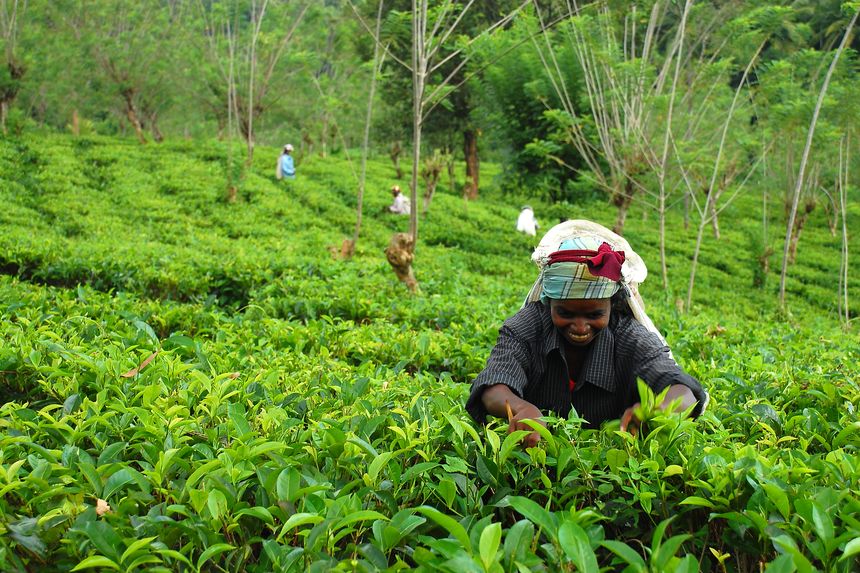

Tea Region
The atmosphere of the Sri Lanka high plateaus is quite different from the rest of the country. In this mountainous region, the landscapes are a blend of cascades, tea plantations and tropical forests. Thanks to its mild climate, the British planted tea here during the Colonization period. South of Kandy, Nuwara Eliya is the highest city of Sri Lanka. It was built in the 19th century by the British Colonists and you can still see some architectural remnants of this occupation, a racecourse and even a golf course! Take the opportunity to visit a tea factory and find out the secrets of the Ceylon tea. The small village of Ella is really appreciated by travellers for its relaxed atmosphere, its waterfalls, viewpoints and countless potential hiking trails in its surroundings. In Haputale, walk to Lipton Seat, where Sir Thomas Lipton used to gaze upon his domain. Don't miss out on a train journey between Haputale and Ella for a beautiful trip through the tea plantations.
Waterfalls | Hiking | Mountain | Nature | Viewpoint
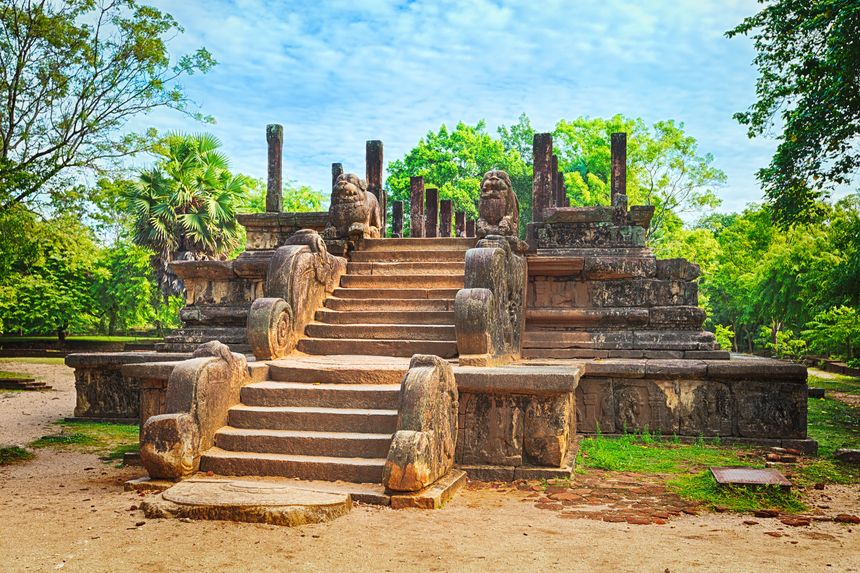

Polonnaruwa
Listed as a UNESCO World Heritage site, Polonnaruwa was the second capital of the Sri Lankan Kingdom from the 10th to the 13th century. The golden age of the city was with the King Parakrama Bahu the first who undertook major renovations including the construction of a huge reservoir capable of irrigating the surrounding paddy fields, still in use today. Nature reclaimed its rights after the decline of the city and the jungle invaded the site and now merges with the stones and the buildings which gives it a unique charm. You can spot a few macaques playing in the vast shaded park, people come to visit the ruins, the palaces and most importantly the Gal Vihara, a cluster of beautifully sculpted statues representing Buddha. The best way to explore this vast archaeological site is by bike, with a local guide.
UNESCO World Heritage | Architecture | Monuments | Archaeological sites
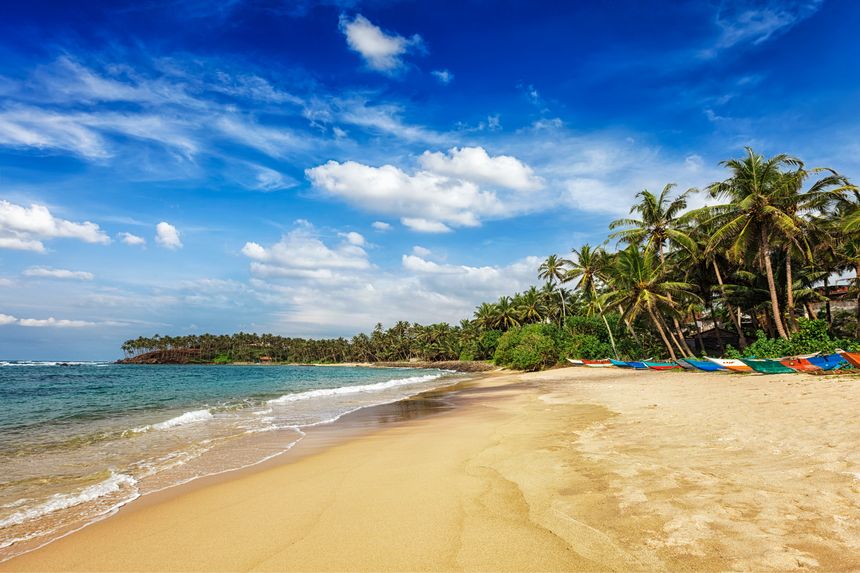

Southern Beaches
The south of the island is known for its superb white sandy beaches lined with coconut trees. From Galle to Tangalle, the atmospheres differ according to your taste. Unawatuna, not far from Galle, has the advantage of offering a large variety of accommodation and allows you to stay on the beach while still being able to visit the Fort of Galle which is close by on a rickshaw, the local transport system. The bay of Weligama is very well known among surfers, it’s also where locals do their fishing on stilts. Mirissa is often the most appreciated beach of the bay among visitors for its relaxed and festive atmosphere. It is also very popular among surfers. After leaving the big city of Matara, the coast gets more and more wilder. The huge beach of Tangalle stretches for miles and miles.
Relaxation | Sea | Beaches & Seaside resort | Water sports
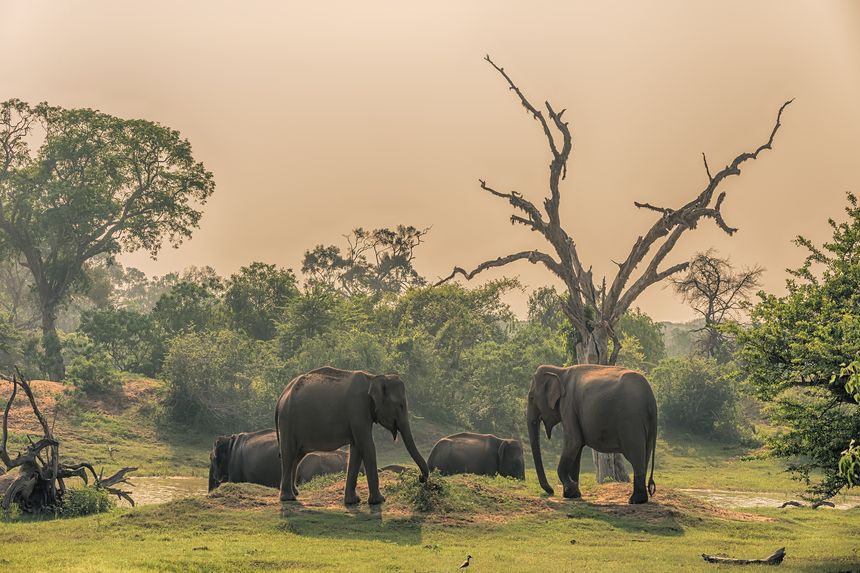

Yala National Park
For nature lovers, the National park of Yala is a must-see during your trip to Sri Lanka. The second largest park in the country after Wilpattu, there are more than 200 species of birds, elephants, buffalo, monkeys, sloth bears, crocodiles and leopards. The Yala park is known for sheltering the biggest leopard population in the world! Add to this its perfect geographic location in the South East of the island and you can easily understand why Yalta has become the most visited park in Sri Lanka. From the city of Tissamaharama, where most of the hotels are concentrated, nature guides can take you on a safari in the park. Go there for the opening of the park just before all the jeeps arrive. The area is very crowded during peak season, between December and February.
Animals | Nature | Safari | Nature reserve | Fauna observation
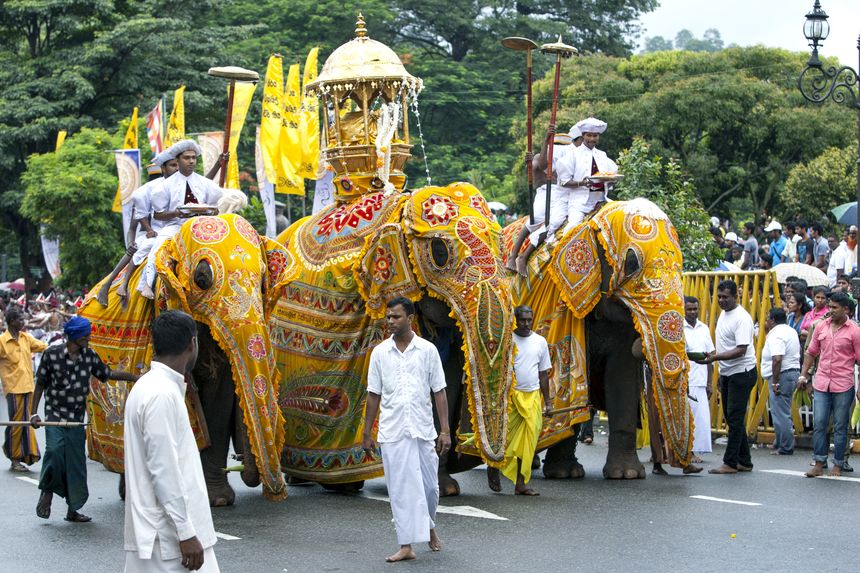

Kandy
The last royal capital of Sri Lanka, Kandy is situated at the feet of the central mountains. Listed as a UNESCO World Heritage site, its main historical landmark is the Temple of the Sacred Tooth Relic, which shelters a relic of the Buddha’s tooth. Considered by Buddhists as a source of infinite power, the sacred tooth was moved several times in history to different capitals of the Sri Lankan kingdom, from Anuradhapura to Polonnaruwa and finally to Kandy. Known as the cultural capital of Sri Lanka, Kandy is also renowned for its Kandyan dances which can be seen during daily performances or in the summer during the festival of Esala Perahera, one of the most beautiful religious processions in the world. To get away from the bustle of city life, take a walk in the magnificent botanical gardens of Peradeniya.
Art & Culture | Parties & Festivals | Monuments | UNESCO World Heritage | Mountain
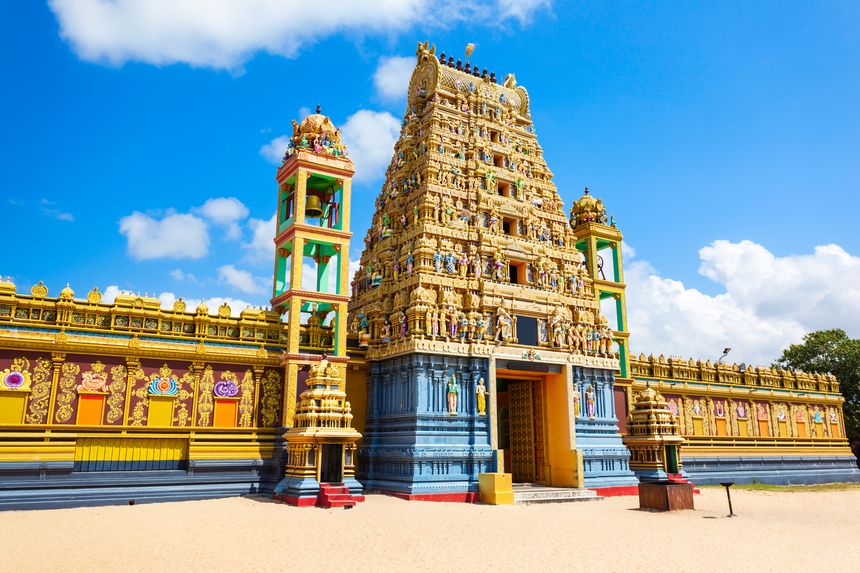

Jaffna
In Northern Sri Lanka, the Jaffna peninsula is the heart of the Tamil culture. Cast aside for years during the Civil war years, the region is now gradually opening up to tourism. Jaffna will show you a completely different facet of Sri Lanka. Travellers often use the word “authentic” to describe their stay in Jaffna. Everything changes here, language, culture, customs, cuisine and even the climate. In a country that remains mainly Buddhist, you will be quite surprised to come across coloured Hindu temples, similar to the ones in South India. The Nallur Kandaswamy Kovil is the most important Hindu worship site in the country. A rickshaw ride to the village of Point Pedro is a nice way to discover the wild landscapes of the coast and the peninsula as a whole.
Gastronomy | Monuments | Heritage
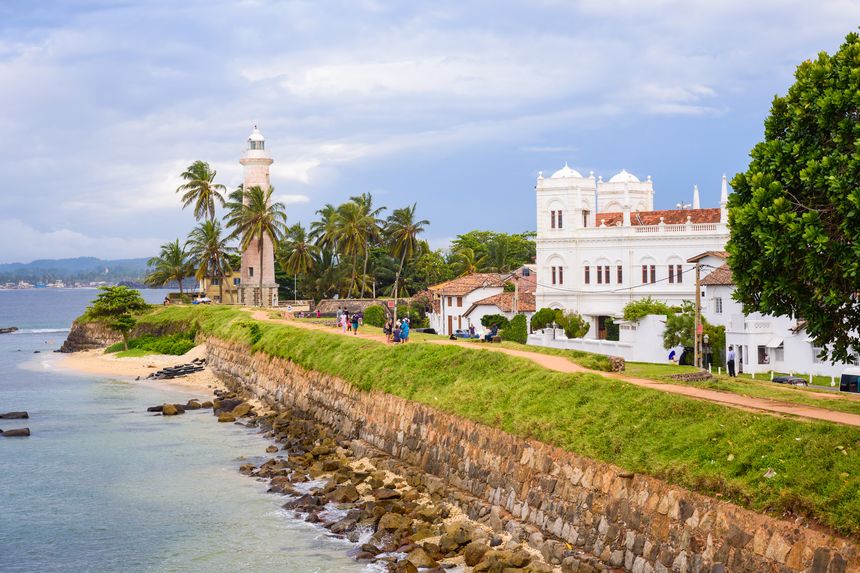

Galle
It’s the most charming city on the island! The Portuguese initiated the construction of the fort in the 16th century, the Dutch extended it by building ramparts in the 17th century. The port of Galle became the most important in the country under British rule. Today, the old town of Galle and its fortifications are listed as a UNESCO World Heritage site. Churches, Mosques and Buddhist temples represent the diversity of communities living in Galle. Plenty of cafés, restaurants and shops are to be found in the picturesque alleyways of the city which is surrounded by Colonial buildings. Old and beautiful Dutch style Colonial mansions have been transformed into charming hotels. However, please note that, depending on your budget, spending a night in the fort of Galle is far more expensive than anywhere else in the country. At sunset, meet up in front of the Galle Lighthouse, a not to be missed historical landmark of the city from where you can take a walk along the ramparts.
Art & Culture | Architecture | Craftsmanship | UNESCO World Heritage | Shopping
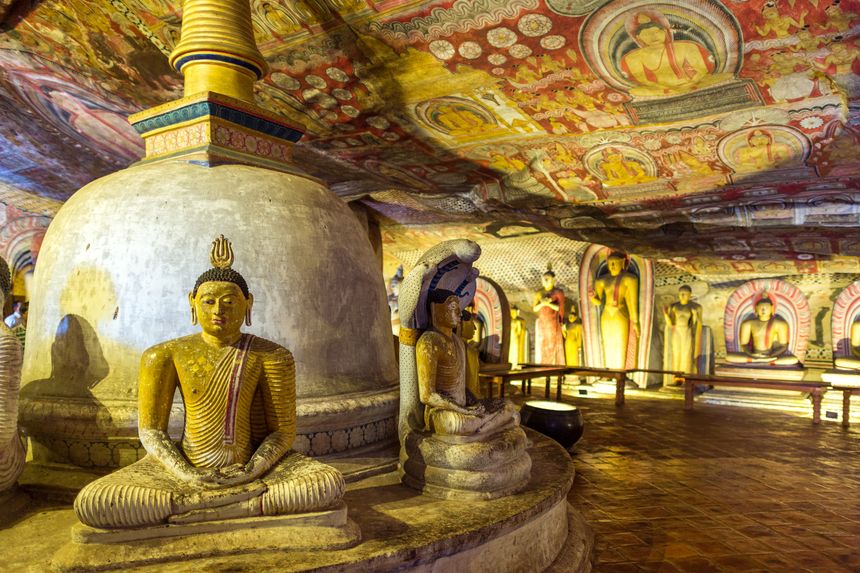

Dambulla
In the centre of the cultural Triangle stands the important historical site of Dambulla. Once a shelter for a King who was exiled from Anuradhapura he transformed the caves of Dambulla into beautifully decorated temples, now listed as a UNESCO World Heritage site. This range of cave paintings dating back from the 2nd century B.C is one of the most well preserved sites of Sri Lanka. You mustn't miss out either on the Golden temple with the imposing golden Buddha on top of it. Take the stairs on the sides of the temple to reach the caves on top of the hill. Inside you will discover cave paintings along with many Budda statues. You will also have the chance to discover the oldest Buddha statue in Sri Lanka, which is carved in the rock, this horizontal Buddha measures 15 metres in length.
Monuments | UNESCO World Heritage | Archaeological site
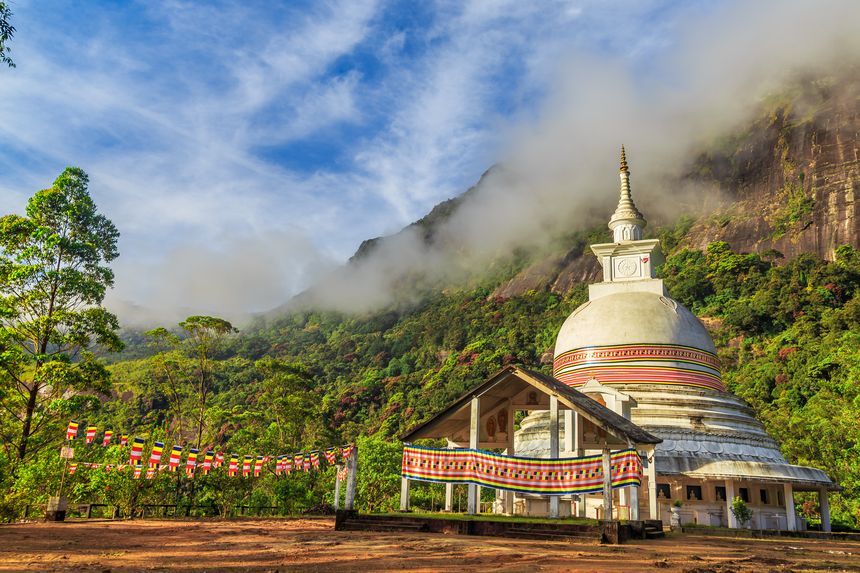

Adam’s Peak
South-west of the high plateaus region, Adam’s Peak (2243m / 7,359 ft) is one of the most impressive mountains in Sri Lanka. On the summit, a footprint engraved in rock has attracted pilgrims from all confessions for centuries. The interpretation differs depending on different Religious beliefs: for Buddhists, it is the Buddha’s footprint, Shiva’s for the Hindus, Adam’s for Muslims or Saint Thomas’ for Christians. The pilgrimage season is between the December and May’s full moon. You will walk in the night on a path lit by a thousand lights along with Sri Lankan pilgrims. After climbing more than 5000 steps, you will finally reach the summit of the Sacred mountain in order to be able to contemplate the sunrise. In clear weather, the triangular shadow of the mountain covers the surrounding landscapes. This hike which is quite tiring is preferably for people in good physical shape.
Hiking | Natural wonders | Mountain | Nature | Viewpoint
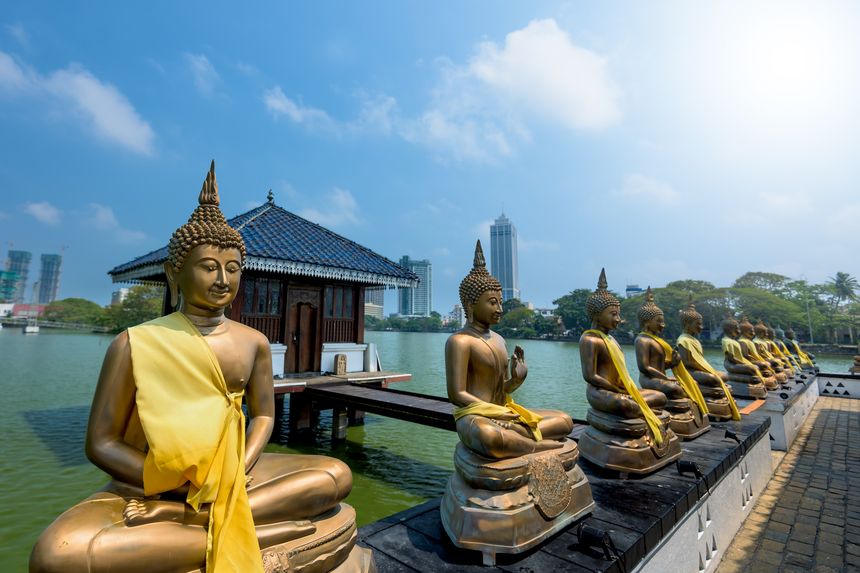

Colombo
Colombo Situated on the eastern coast of the island, on the European and Asian trading routes, Colombo is nowadays the economic capital city of Sri Lanka. For some time now, the city has enjoyed a renaissance and lots of new constructions regularly emerge. You will find here several interesting historical places such as Galle Face Hotel, a majestic palace built in front of the Indian Ocean in 1864. Explore the Duct Fort area on a rickshaw to see the Colonial buildings. The Duct hospital, built in the 17th century, has several top quality restaurants. Go for a pleasant walk in the shopping streets of Pettah. Don't forget to visit the temple of Gangaramaya, which still remains an active Buddhist site. February’s full moon, called Navam Perahera, will be the perfect opportunity to be able to grasp the atmosphere of religious fervour in the streets of Colombo. At sunset, go for a walk along the Indian Ocean's coast on Galle Face Green, an esplanade where the local Colombo inhabitants gather regularly.
Architecture | Craftsmanship | Gastronomy | Market | Shopping
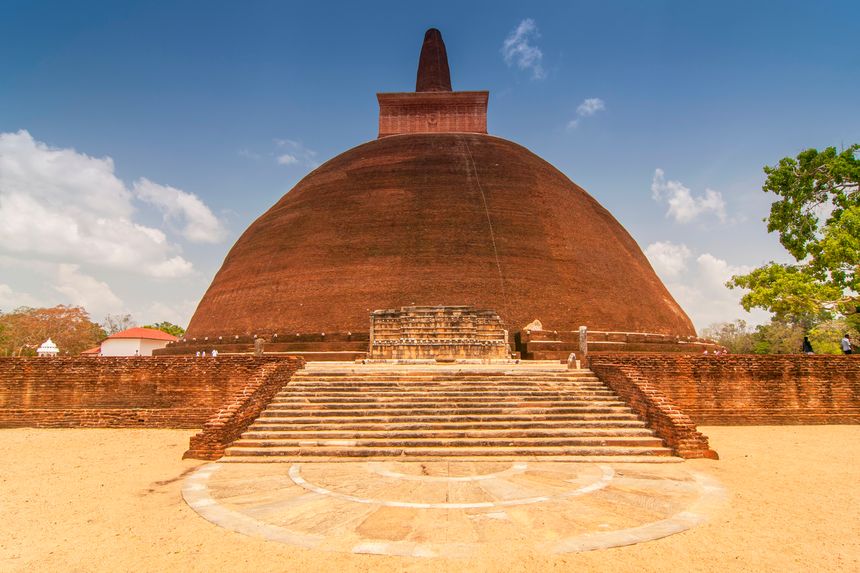

Anuradhapura
North of the Cultural Triangle, the city of Anuradhapura is a major Sacred place for Sinhalese Buddhism. Composed of the cities of Anuradhapura, Polonnaruwa and Kandy, this triangle contains most of the archaeological heritage of Sri Lanka. The first Royal capital of Sri Lanka from the 4th century B.C until the 10th century, it is now listed as a UNESCO World Heritage site. The most symbolic monuments are the gigantic Dagoba Jethawanaramaya and Sri Maha Bodhi, the most sacred temple on the island. The latter was built around the sacred tree of Bodhi, one of the oldest in the world, coming from cuttings of the tree under which Buddha reached the awakening in northern India. A great sense of religious fervour is created by this mystic place where countless believers, monks and families come to gather, pray and give offerings.
Architecture | Monuments | UNESCO World Heritage | Archaeological sites

Travel editor
Sophie's review
In my opinion, Sri Lanka is a blend of history, nature and meetings, and of course sunshine. It is also the island of the smile and spirituality, one quickly feels at ease thanks to the warm welcome of the Sri Lankans. This destination is ideal for family travel, thanks to the good tourist infrastructure and the wide choice of activities. It is also a country emerging from a tumultuous history, between a long civil war and a devastating tsunami, and one that is experiencing a booming tourism development. In this context, do not hesitate to think outside the box and avoid high season periods.
You may also like
-
Flights to Sri Lanka
All you need to know before buying your plane ticket
-
Tourist maps
Must-see and secret places chosen by our experts from Sri Lanka.
-
Hotel or vacation rental?
Find your dream accommodation in Sri Lanka at the best price...
-
When to go?
Be sure to visit Sri Lanka at the best time of year!
and why not...
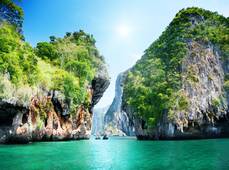 Thailand
Thailand


